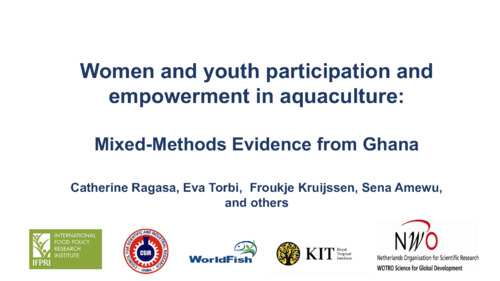Exploring women and youth engagement in aquaculture: Mixed-methods evidence in Ghana
Abstract
This paper identifies the challenges, aspirations, and entry points for greater participation and empowerment of youth and women in the fast-growing aquaculture value chain in Ghana. Data was collected from three survey rounds of 400 fish farmers; 32 key informants’ interviews; and 5 FGDs with female-only, femaleyouth-only, and male-youth-only groups. Four study highlights are as follows. First, the study shows that respondents all indicated they wanted to continue or start aquaculture and expand to other stages of the value chain (hatchery, feed formulation, processing). Second, this study shows how norms and attitudes differently impact women, who are often discouraged because of their gender; and young men, who are often teased with being a fisherman when studying aquaculture and who have less access to finance and skills development. Third, intersectionality allowed us to understand that aquaculture is easy for women to combine with reproductive work if the farm is located close to home, and seen as very tedious if it is isolated. Fourth, this study also sought to understand quality of participation. Qualitative interviews showed that income and financial security is just one of the factors that determines quality of participation in the aquaculture chain. Other important factors for those involved in aquaculture included social recognition by neighbours, the community, and beyond. For women specifically, being a grow-out farmer or processor allowed them to gain their own income and feel selfreliant while combining their work with childcare and housework.

